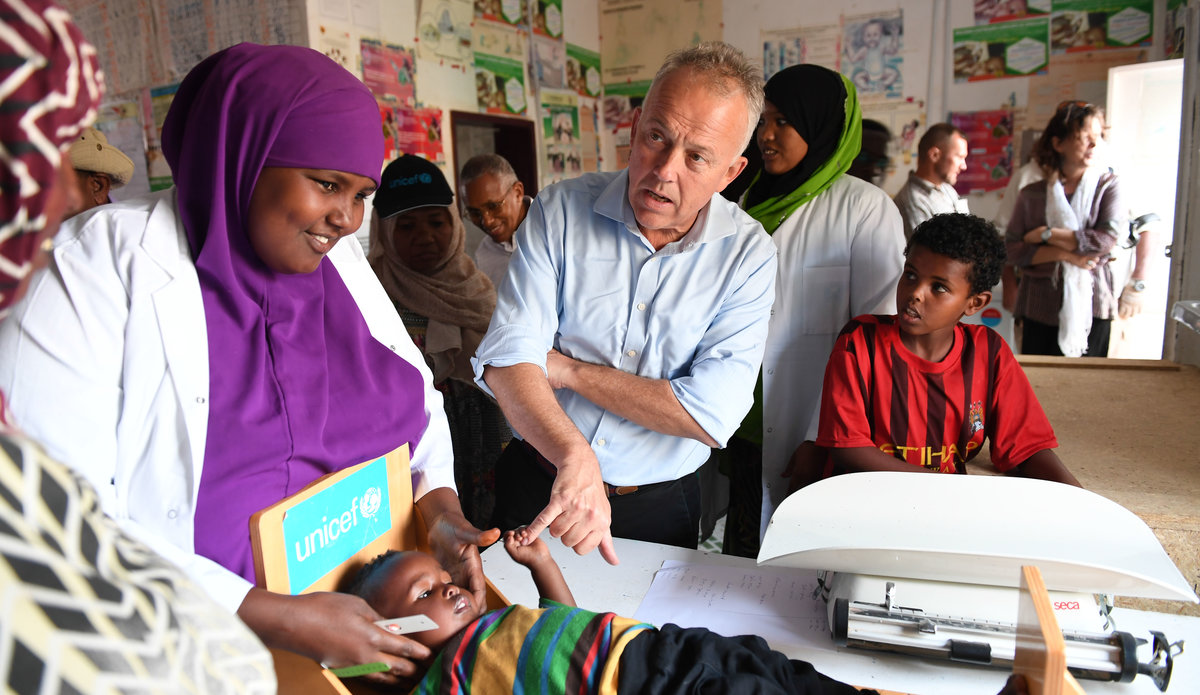UN Special Representative for Somalia visits Somaliland to assess impact of drought
The Special Representative of the United Nations Secretary-General (SRSG) for Somalia, Michael Keating, concluded a two-day visit to Somaliland to assess the impact of the prolonged drought on its population.
Mr. Keating held talks with senior government officials, led by President Ahmed Mohamed Mohamoud Silanyo, members of the National Drought Response Committee, civil society representatives and United Nations agencies.
The discussions focused on how to scale up and improve coordination of ongoing drought response activities to help meet the needs of affected communities.
“The people of Somaliland should not have to go through this again. We have been talking about recovery and resilience plans, how the UN can contribute to the work of Somaliland Government and civil society. We have also been talking about the role of the UN more broadly here in Somaliland,” said Mr. Keating during a press conference after he met with President Silanyo.
Foreign Affairs Minister Saad Ali Shire echoed the SRSG’s sentiments and called on the UN and the international community to continue supporting the Somaliland government’s efforts to tackle the crisis.
Mr. Keating visited communities affected by the drought in Laaca village, located about 70 kilometers west of the Somaliland capital of Hargeisa. He visited a water distribution site established by a local non-governmental organization called Health Education Agro-pastoralist Liaison (HEAL) with funding from UNICEF. The partnership of HEAL and UNICEF is providing safe drinking water and hygiene kits to local schools and approximately 2,700 households.
Village elder Ahmed Abdi Jama said a number of families displaced by the drought had relocated to the area, thereby exhausting the available resources for residents of Laaca.
“We are requesting and appealing for food aid as host communities and those who have been displaced,” said Ahmed.
Mr. Keating also visited a maternal and child health and nutrition clinic in Gabiley town, west of Hargeisa, to assess the medical needs of the local population.
Ms. Asha Abdi Ali, the team leader at the clinic, said the drought had triggered a recent jump in the number of malnourished children who have been brought in for treatment. She said the increased number of patients has put an additional strain on the clinic’s staff and resources.
The SRSG pledged to redouble efforts to draw international attention to the precarious situation in Somaliland and raise more funds to respond more effectively to the humanitarian needs.
Foreign Minister Shire accompanied the SRSG on the field visit and stated that hundreds of livestock animals have died due to a lack of water and pasture, depriving many pastoral communities of their only source of income.
“We are thankful to the humanitarian agencies assisting the communities. I am also thankful to UNICEF (United Nations International Children’s Emergency Fund) who welcomed the people affected by the drought. We only have to jointly work as government and humanitarian agencies to ameliorate the conditions of the people,” said Minister Shire.
Sheikh Khalil Abdullahi Ahmed, the Somaliland Minister of Religious Affairs and a member of Somaliland’s Drought Response Committee, said the drought had affected 1.5 million people. He said the Somaliland government had developed a plan to give US$60 per month to each affected family but has been unable to provide the stipends owing to inadequate funding.
While communities struggle to cope with the challenges of malnutrition and displacement, humanitarian aid workers warned that the possible onset of rains during the upcoming Gu season could trigger flooding and a spike in waterborne diseases such as cholera.
The SRSG emphasized the need to develop long-term solutions to the plight of Somaliland residents who have been hard hit by the current drought and will remain vulnerable to the recurrence of similar humanitarian crises in the foreseeable future.
“In addition to responding immediately, there is the problem of how do you recover from all this,” said Mr. Keating. “How are we going to rebuild people’s capacities to cope? There may be yet another drought in a year’s time or two years’ time. So, we really have got both the immediate problem and the kind of deeper problems of addressing the structural problems as a result of this vulnerability.”
Civil society representatives told the SRSG there had been an increase in the number of journalists who have been arrested and detained in Somaliland since the start of 2017. They also urged the United Nations to promote the political empowerment of women in Somaliland in the same way the organization had done during Somalia’s 2016 electoral process.
 UN
UN





